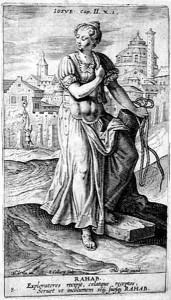From the Category, “The Eastern Eye”
[The Bible is an “Eastern” book. It was written many years ago in the “East” which today we refer to as “The Middle East.” As such, there are many customs and idioms that are not familiar to the “Western” mind.
In understanding the Scriptures it is important for us to understand the culture, but it doesn’t mean that we should necessarily follow that culture. Rather, it is in the understanding of the Eastern culture that we gain light and understanding about many things in the Bible.]
There is a very interesting event that is recorded in Acts 21. The Apostle Paul was staying in Caesarea at the home of Philip the Evangelist. Paul was on a journey to Jerusalem.
A prophet from Judea, named Agabus, came to the house with a message for Paul. However, the message he had for Paul was given to him in a rather dramatic fashion. Agabus took Paul’s girdle, bound his own hands and feet, and then told Paul, “Thus says the Holy Ghost, So shall the Jews at Jerusalem bind the man that owns this girdle, and shall deliver him into the hands of the Gentiles.”
What was Paul’s “girdle?” We would call it a belt, or a sash or a cord. In many cases in Bible times, it was hollow, so the girdle served not only to secure flowing garments but also to carry money in.
There are other records in the Bible that show prophets delivering a message in a very dramatic way adding to their words something very visual. Isaiah, Ezekiel and others used this form of communication to call attention, to give a distinct and impressive idea of the subject, and, by engaging the imagination, to fix it in the memory.
What Was The Will Of God
So was Paul not supposed to go to Jerusalem? Was he wrong in going? Did he disobey God’s specific instructions?
Just a few days before arriving at Philip’s house, Paul was in the city of Tyre. While he was there, some disciples told Paul, through or by way of the Spirit, that he should not go to Jerusalem.
In the previous chapter, you can read of Paul getting information from God that if he went to Jerusalem, bonds and afflictions were waiting for him. God had warned him. Yet, Paul was determined to go to Jerusalem.
It is also very clear in Chapter 20 that it was Paul who decided to go to Jerusalem. It says that he determined to not go to Ephesus so that he could be in Jerusalem at the day of Pentecost. He was the one who decided to go to Jerusalem.
While in Miletus, he told them that he was going to Jerusalem, but that he was bound in the sprit. He was not free in the spirit, but rather he was bound. He even told them that God was revealing to him every day the consequences that would happen if he indeed went to Jerusalem.
So he proceeded on his journey. In Tyre, disciples told him by way of the Spirit not to go to Jerusalem. Then, the prophet Agabus gives Paul a message from God in a very dramatic fashion. The will of God for Paul is very clear.
The Conflict Over The Commas
Most Christians do not want to admit that Paul made a mistake by going to Jerusalem. So they ignore all the clear verses that show how God is trying to keep Paul out of Jerusalem, and instead focus on one verse, and let a punctuation mark settle the argument.
After all the daily warnings from God to Paul, as well warnings from others by way the spirit telling him not to go, then comes the dramatic warning from Agabus. Those who saw and heard what Agabus did began to cry and beg Paul not to go.
Paul’s reaction was very courageous. He asked them why they were crying and breaking his heart. He then told them he was not only ready to be bound at Jerusalem, but also to die.
Paul was very committed. His response to them at Phillip’s house sounds very courageous, but what good could Paul do for God if he were dead? How hindered would his ministry be if indeed he were bound as Agabus had foretold?
But alas, the next verse has a comma or two that many people use to “prove” that Paul going to Jerusalem was really the will of God. The verse, in the King James Version, says, “And when he would not be persuaded, we ceased, saying, The will of the Lord be done.” I don’t want to argue about commas, especially because in the original texts, there were no commas.
Adjusting the commas in that verse, or, even ignoring them, it could very easily read, “And when he would not be persuaded we ceased saying the will of the Lord be done.” In other words, Paul was not to be persuaded, so we stopped saying what the will of the Lord was.
Ignoring the many verses that clearly show what the will of the Lord was, and then using a comma or two to try and prove a point is a dishonest handling of the Scriptures.
Foretelling The Future
What Agabus foretold did indeed come to pass. That is the measure of a true prophet: what they declare will happen, does indeed happen. If it doesn’t come to pass, the Scriptures say to pay no attention to that prophet.
Today there are many voices coming from many places that are predicting and foretelling the future. Especially in reference to the worldwide economic crisis, you hear people making their predictions every day. Who are you listening to?
I do not claim to be a prophet; I am not predicting the future. But, like many, many people, I do believe there are some very serious days ahead before things can ever begin to turn around. And, I also know that our God is a very personal God.
Look at how God tried to get through to the Apostle Paul to save him from serious trouble. God did so much to keep him from going to Jerusalem. But, God did not overstep Paul’s free will.
God can give you guidance for your life, especially in these treacherous days that we live in. God’s love for you, just like His love for Paul, is unconditional and nothing can ever separate you from His love. But remember, God will not overstep your free will.
Put your confidence in God. Pay attention to His still small voice. Never be afraid to shift your direction for His direction.
Dueteronomy 18:22
When a prophet speaks in the name of the LORD, if the thing follow not, nor come to pass, that is the thing which the LORD has not spoken, but the prophet has spoken it presumptuously: you shall not be afraid [have reverence or regard] of him.Acts 20:15 and 16
And we sailed there, and came the next day over against Chios; and the next day we arrived at Samos, and tarried at Trogyllium; and the next day we came to Miletus.For Paul had determined to sail by Ephesus, because he would not spend the time in Asia: for he hasted, if it were possible for him, to be at Jerusalem the day of Pentecost.
Acts 20:22-24
And now, behold, I go bound in the spirit unto Jerusalem, not knowing the things that shall befall me there:Save that the Holy Ghost witnesses in every city, saying that bonds and afflictions abide me [if I go there].
But none of these things move me, neither count I my life dear unto myself, so that I might finish my course with joy, and the ministry, which I have received of the Lord Jesus, to testify the gospel of the grace of God.
Acts 21:3 and 4
Now when we had discovered Cyprus, we left it on the left hand, and sailed into Syria, and landed at Tyre: for there the ship was to unlade her burden.And finding disciples, we tarried there seven days: who said to Paul through the Spirit, that he should not go up to Jerusalem.
Acts 21:8-15
And the next day we that were of Paul’s company departed, and came unto Caesarea: and we entered into the house of Philip the evangelist, which was one of the seven; and abode with him.And the same man had four daughters, virgins, which did prophesy.
And as we tarried there many days, there came down from Judaea a certain prophet, named Agabus.
And when he was come unto us, he took Paul’s girdle, and bound his own hands and feet, and said, Thus says the Holy Ghost, So shall the Jews at Jerusalem bind the man that owns this girdle, and shall deliver him into the hands of the Gentiles.
And when we heard these things, both we, and they of that place, besought him [Paul] not to go up to Jerusalem.
Then Paul answered, What mean you to weep and to break mine heart? for I am ready not to be bound only, but also to die at Jerusalem for the name of the Lord Jesus.
And when he would not be persuaded, we ceased, saying, The will of the Lord be done.
And after those days we took up our carriages, and went up to Jerusalem.
Mike Verdicchio
2011
Leave A Comment!
Do you have some thoughts about this? We’d love to hear what you think. To leave a comment if you are receiving this post via email or RSS, just click the title above and scroll to the bottom of the post and type in your comment. If not, just scroll to the bottom of this post and type in your comment.
Share This Article!
To share this article on social media, like Facebook, or, Twitter, there are links below.
Resources
There are a number of books that you can read to get insight on customs, manners, idioms and meanings from the Eastern culture in which the Bible was written. The best I know of were written by Bishop K. C. Pillai. I have had the pleasure of listening to many recorded teaching by him.
He wrote three books, and they are hard to find, and are usually over priced. But, if you want to you can check this link to see what Amazon has to offer. Light Through an Eastern Window
Another great resource that I have used for years is a book called, “Manners and Customs of the Bible,” by James Freeman. Mine was printed in 1972 and I know they have newer additions. For the newest edition, just click the link and it will take you to Amazon. The New Manners and Customs of the Bible (Pure Gold Classics)








 In the lands and times of the Bible, in the small villages, early in the morning a young boy would lead the animals out to the fields. He would go to the different owners of the animals and lead them out to the field to graze. He would lead the asses from their cribs. He would lead the cows and oxen from their mangers.
In the lands and times of the Bible, in the small villages, early in the morning a young boy would lead the animals out to the fields. He would go to the different owners of the animals and lead them out to the field to graze. He would lead the asses from their cribs. He would lead the cows and oxen from their mangers. healing, abundance, and all that we need. Those who are complaining and looking for sympathy and pity need to have at least the smarts of an ass and turn to God.
healing, abundance, and all that we need. Those who are complaining and looking for sympathy and pity need to have at least the smarts of an ass and turn to God. When it comes to Rahab, we really need to take a step back and consider the culture. First, we need to understand women in the times of the Bible. They covered their faces with veils. They did not talk to any men except their husbands and relatives. For them to be unveiled or to talk to strangers was a deviation from the standard.
When it comes to Rahab, we really need to take a step back and consider the culture. First, we need to understand women in the times of the Bible. They covered their faces with veils. They did not talk to any men except their husbands and relatives. For them to be unveiled or to talk to strangers was a deviation from the standard.